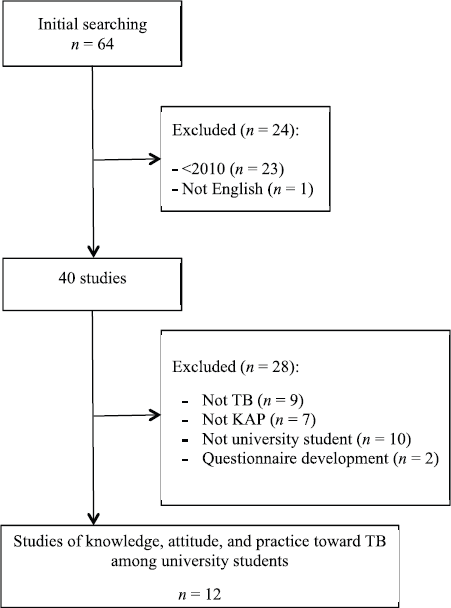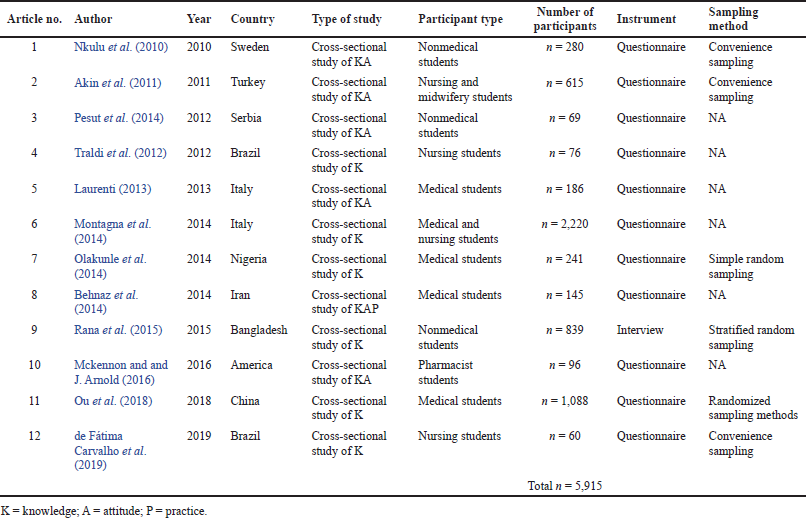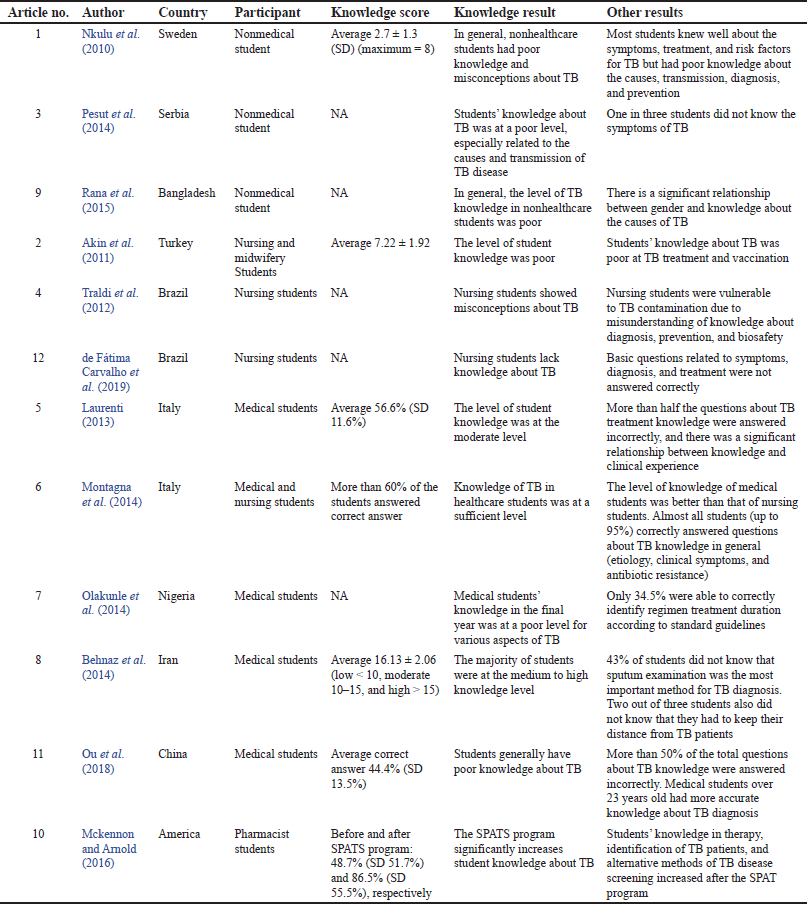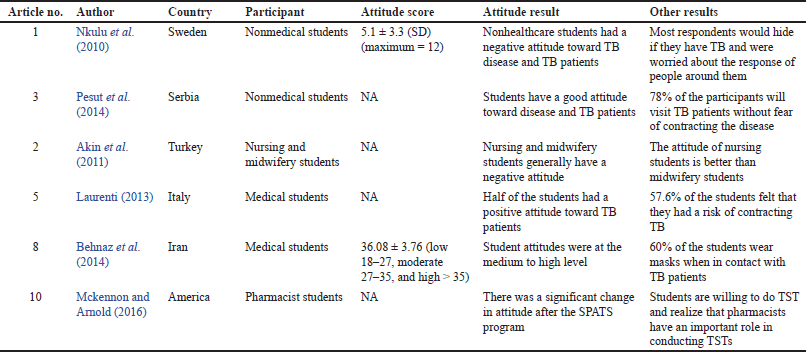INTRODUCTION
Tuberculosis (TB) is an infectious disease caused by an acid-resistant bacterium called Mycobacterium tuberculosis and is one of the 10 main causes of death (Ministry of Health Republic of Indonesia, 2018). TB symptoms are divided into respiratory and systemic symptoms (Indonesian Society of Respirologist, 2019). Respiratory symptoms consist of coughing up phlegm for more than 3 weeks, bleeding cough, and shortness of breath, while systemic symptoms include fever, decreased body weight, and night sweats (Indonesian Society of Respirologist, 2019).
According to the World Health Organization (WHO), TB remains the most dangerous infectious disease and a major problem for global public health (World Health Organization, 2019). In 2018, the WHO estimated that 10 million people suffered from TB, with 1 case being equivalent to 132 cases per 100,000 people (World Health Organization, 2019).
Research about the knowledge, attitude, and practice (KAP) has been frequently used in health studies. KAP research was also used as a research tool to obtain information known and believed among research participants (Haq et al., 2012). Therefore, KAP studies play an important role in determining community ambiguity (Haq et al., 2012).
A previous study has reported that a high prevalence of TB occurred among students in a university in Ethiopia (Wolde et al., 2017). A crowded environment and high-contact person-to-person environment in the universities and schools can be potential sources of disease transmission including TB (Dorji et al., 2020). It has been shown that lack of knowledge and negative attitudes toward TB are major problems in the prevention, controlling, and curing of TB disease (Luba et al., 2019). It is important to research KAP toward TB among students because students have a high risk of TB spread (Zhang et al., 2018). Therefore, this article summarizes the TB knowledge, attitudes, and practice research among university students.
METHODS
Literature searches were conducted in March 2020 through the PubMed electronic database. PubMed is a free search engine that comprises more than 32 million citations for biomedical literature from MEDLINE, life science journals, and online books. The keywords for literature search are “Knowledge,” “Attitude,” “Practice,” “University student,” and “TB.” The following are the search details: (“knowledge” [MeSH Terms] OR “knowledge” [All Fields]) AND (“attitude” [MeSH Terms] OR “attitude” [All Fields]) AND (“Practice [Birm]” [Journal] OR “practice” [All Fields]) AND (“TB” [MeSH Terms] OR “TB” [All Fields]) AND (“universities” [MeSH Terms] OR “universities” [All Fields] OR “university” [All Fields]) AND (“students” [MeSH Terms] OR “students” [All Fields] OR “student” [All Fields]) NOT (“review” [Publication Type] OR “review literature as topic” [MeSH Terms] OR “review” [All Fields]). The initial search results yielded 64 articles. Articles prior to 2010 and non-English language were excluded. From 64 articles, 12 articles of knowledge, attitudes, and practices toward TB among university students were obtained. The literature search flowchart is shown in Figure 1.
RESULTS AND DISCUSSION
Studies of knowledge, attitudes, and practices toward TB
Table 1 shows 12 articles about knowledge, attitudes, and practices toward TB among students globally. All articles are cross-sectional studies; 11 used questionnaires as research instruments, while an additional article used the method of direct interviews with respondents. Respondents who participated in the studies are university healthcare and nonhealthcare students. Respondents totaled 5,915 students globally, ranging from 60 to 2,220 with random, convenience, and stratified random sampling techniques.
TB knowledge among university students
Table 2 shows the 12 articles presenting students’ knowledge of TB. Nine articles were studies on university healthcare students and three articles on nonhealthcare university students.
Research on nonhealthcare students conducted in Bangladesh, Sweden, and Serbia revealed that they have a poor level of TB knowledge (Nkulu et al., 2010; Pesut, 2014; Rana et al., 2015). Students in Sweden have an average TB knowledge score of TB 2.7 ± 1.3 (SD) (maximum = 8). Only 40 (15%) out of 268 respondents answered correctly for half of the questions (Nkulu et al., 2010). In general, nonhealthcare students’ knowledge level in Bangladesh and Serbia is poor, and there are misconceptions about TB disease (Pesut, 2014; Rana et al., 2015).
| Figure 1. Flowchart of the literature search. |
| Table 1. List of articles. |
Research in China, Rome, Brazil, and Nigeria showed that healthcare students have a poor level of knowledge of TB, answering more than 50% of the questions incorrectly (Ou et al., 2018). Other questions that included basic inquiries relating to symptoms, diagnosis, and treatment were also answered incorrectly (de Fátima Carvalho et al., 2019; Laurenti, 2013; Olakunle et al., 2014; Ou et al., 2018; Traldi et al., 2012). The percentage of the total average correct answers regarding TB knowledge was 44.4% (SD 13.5%) for healthcare students in China, while students in Rome have a percentage of 56.6% (SD 11.6%) (Laurenti, 2013; Ou et al., 2018). Research in Iran showed that healthcare students have a medium to high level of knowledge (moderate to high) with a knowledge score of 16.13 ± 2.06 (low < 10, moderate 10–15, and high > 15) (Behnaz et al., 2014). Research in Italy compared the knowledge between medical and nursing students, revealing that medical students have better knowledge about TB compared to nursing students. The knowledge level of students in Italy was sufficient (>60% of students answered questions correctly) (Montagna et al., 2014). Research in Turkey compared the knowledge of nursing and midwifery students with 615 participants (Akin et al., 2011). The result found a poor level of student knowledge, with a score of 7.22 ± 1.92 (Akin et al., 2011). The American study of pharmacist students used the Student Pharmacists as Tuberculosis Screeners (SPATS) program created by the Washington State Pharmacy Association (Mckennon and Arnold, 2016). Students received training in TB epidemiology, pathophysiology, and treatment. Before and after conducting the training, students were asked to complete questionnaires about TB knowledge (Mckennon and Arnold, 2016). Before the SPATS program was conducted, the average score of students’ knowledge about TB was 48.7% (SD 51.7%); after the SPATS program was implemented, the average score was 86.5% (SD 55.5%). This indicates that students’ knowledge almost doubled following the SPATS program (Mckennon and Arnold, 2016).
Attitude toward TB among university students
Table 3 shows a list of articles discussing students’ attitudes toward TB. Six articles discuss students’ attitudes toward TB (two on nonhealthcare students and four on healthcare students). The nonhealthcare students in Sweden have an average score of 5.1 ± 3.3 (SD) (maximum = 12), which shows that most students have a negative attitude toward TB disease and its patients (Nkulu et al., 2010). In Serbia, six out of eight nonmedical students did not visit TB patients for fear of contracting it, and 61 out of 69 students never wanted to be close to TB patients (Pesut, 2014). Negative attitudes toward TB disease and patients are caused by adverse stigma and cultural barriers. These negative attitudes affect not only TB sufferers but also their family members and closest relatives (Nkulu et al., 2010).
| Table 2. Knowledge among students. |
Iranian healthcare students have a score of 36.08 ± 3.76 (low 18–27, moderate 27–35, and high > 35), indicating that the level of student attitudes was medium to high (moderate to high) (Behnaz et al., 2014). A study in Turkey compared the attitudes of nursing students with midwifery students (Akin et al., 2011). The results showed that nursing and midwifery students generally have a negative attitude, but nursing students’ attitudes are better (Akin et al., 2011). The study of pharmacist students in the USA using the SPATS program resulted in significant changes in attitudes toward TB and the willingness to perform a tuberculin skin test (TST) (Mckennon et al., 2016). Students also realized that pharmacists are beneficial regarding TSTs (Mckennon et al., 2016).
| Table 3. Attitude among students. |
| Table 4. Practice among students. |
Practice toward TB among university students
Table 4 presents an article discussing students’ practice toward TB. The student practice study was only found in final year students conducted in Yazd, Central Iran (Behnaz et al., 2014). The mean practice score was 22.27 ± 4.95 (low < 20, moderate 20–25, and high > 25), and 11.9% of students had poor practice levels. The practice scores for female students were better than those for male students. In addition, one out of four students had the habit of washing hands before and after being in contact with patients. Students had an effective practice of wearing masks (70.2%), with 60% of the students wearing a mask when in contact with TB patients. Half of the students keep a distance from TB patients. The practice relating to medication is not yet evaluated, because the students are still guided by a supervisor. Nevertheless, 95.1% of the students have known that the standard TB medication is taken for 6 months (Behnaz et al., 2014).
Effort to increase KAP in students
This study revealed poor levels of knowledge for students in 8 of 12 studies; students had a negative attitude in two out of six studies, with one study revealing poor practices in 11.6% of students. KAP improvement must be carried out to help control and prevent TB (Hassan et al., 2017). Poor TB knowledge is one of the main problems in preventing, controlling, and curing TB disease (Luba et al., 2019). In students, poor knowledge was caused by a lack of literacy skills and misconceptions, indicating that curriculum innovation regarding infectious diseases is needed to increase students’ TB knowledge (Laurenti, 2013). Training for pharmacy students in the USA, such as the SPATS program that comprises TB epidemiology, pathophysiology, and treatment, could be conducted to increase knowledge and attitudes among students (Gudeva et al., 2012; Mckennon and Arnold, 2016). The training program resulted in significant changes in students’ knowledge and attitudes toward TB.
Limitation
There are limitations to this review. The literature search was only conducted in one electronic database; nevertheless, this article could provide an overview of knowledge, attitudes, and practice toward TB among students worldwide.
CONCLUSION
This article summarizes the knowledge, attitudes, and practices toward TB among university healthcare and nonhealthcare students. Students in 8 out of 12 studies had poor knowledge levels, students in two out of six studies had a negative attitude, and 11.6% of students in a study still have poor practices. Curriculum innovation regarding infectious diseases is needed to improve students’ TB knowledge, attitudes, and practices.
CONFLICT OF INTEREST
The authors report no conflicts of interest.
FUNDING
This work was supported by the Ministry of Research and Technology and Higher Education, Indonesia (grant number 1123j/UN6.O/LT/2019).
AUTHOR CONTRIBUTIONS
All authors made substantial contributions to conception and design, acquisition of data, or analysis and interpretation of data; took part in drafting the article or revising it critically for important intellectual content; agreed to submit to the current journal; gave final approval of the version to be published; and agree to be accountable for all aspects of the work. All the authors are eligible to be an author as per the international committee of medical journal editors (ICMJE) requirements/guidelines.
ETHICAL APPROVALS
Not applicable.
PUBLISHER’S NOTE
This journal remains neutral with regard to jurisdictional claims in published institutional affiliation.
REFERENCES
Akin S, Gorak G, Unsar S, Mollaoglu M, Ozdilli K, Durna Z. Nurse education today knowledge of and attitudes toward tuberculosis of Turkish nursing and midwifery students. Nurse Educ Today, 2011; 31(8):774–9. CrossRef
Behnaz F, Mohammadzade G, Mousavi-e-roknabadi RS, Mohammadzadeh M. Assessment of knowledge, attitudes and practices regarding tuberculosis among final year students in Yazd, central Iran. J Epidemiol Glob Health, 2014; 4:81–85. CrossRef
de Fátima Carvalho C, Ponce MAZ, da Silva-Sobrinho RA, Mendez RDR, Santos MAD, Santos EMD, Wysocki AD. Tuberculosis: knowledge among nursing undergraduate students. Rev Bras Enferm, 2019; 72(5):1279–87. CrossRef
Dorji T, Tshering T, Wangdi K. Assessment of knowledge, attitude and practice on tuberculosis among teacher trainees of Samtse College of Education, Bhutan. PLoS One, 2020; 15(11):e0241923. CrossRef
Gudeva Nikovska D, Talevski S. How much knowledge is healthy? Result of KAP survey of TB patients in Republic of Macedonia. Eur Respir J, 2012; 40(56):2671.
Haq N, Hassali MA, Shafie AA, Saleem F, Farooqui M, Aljadhey H. A cross sectional assessment of knowledge, attitude and practice towards Hepatitis B among healthy population of Quetta, Pakistan. BMC Public Health, 2012; 12(1):1. CrossRef
Hassan AO, Olukolade R, Ogbuji QC, Afolabi S, Okwuonye LC, Kusimo OC, Osho JA, Osinowo KA, Ladipo OA. Knowledge about tuberculosis: a precursor to effective TB control – findings from a follow-up national KAP study on tuberculosis among Nigerians. Tuberc Res Treat, 2017; 2017:6309092. CrossRef
Indonesian Society of Respirologist. Guidelines for diagnosis and management tuberculosis in Indonesia. Indonesian Society of Respirologist, Jakarta, Indonesia, 2006.
Laurenti P. Knowledge, experiences, and attitudes of medical students in Rome about tuberculosis. Med Sci Monit, 2013; 19:865–74. CrossRef
Luba TR, Tang S, Liu Q, Gebremedhin SA, Kisasi MD. Knowledge, attitude and associated factors towards tuberculosis in Lesotho: a population based study. BMC Infect Dis 2019; 19(96):1–10. CrossRef
Mckennon SA, Arnold J. Student pharmacists as tuberculosis screeners. Am J Pharm Educ, 2016; 80(2):1–6. CrossRef
Ministry of Health Republic of Indonesia. INFODATIN (Data and Information Center Ministry of Health) find TB cases treat until healed. Ministry of Health Republic of Indonesia, Jakarta, Indonesia, 2018.
Montagna MT, Napoli C, Tafuri S, Agodi A, Auxilia F, Casini B, Coscia MF, D'Errico MM, Ferrante M, Fortunato A, Germinario C, Martinelli D, Masanotti GM, Massenti MF, Messina G, Montuori P, Mura I, Orsi GB, Quaranta A, Sotgiu G, Stefanati A, Tardivo S, Torregrossa MV, Tortorano AM, Veronesi L, Zarrilli R, Pasquarella C. Knowledge about tuberculosis among undergraduate health care students in 15 Italian universities : a cross-sectional study. BMC Public Health, 2014; 14(970):1–6. CrossRef
Nkulu FKK, Hurtig A, Ahlm C, Krantz I. Screening migrants for tuberculosis – a missed opportunity for improving knowledge and attitudes in high-risk groups: a cross-sectional study of Swedish-language students in Umeå, Sweden. BMC Public Health, 2010; 10(349):1–12. CrossRef
Olakunle OS, Oladimeji O, Olalekan AW, Olugbenga-Bello A, Akinleye C, Oluwatoyin OA. Knowledge of tuberculosis management using directly observed treatment short course therapy among final year medical students in South Western Nigeria. Pan Afr Med J, 2014; 18:32. CrossRef
Ou Y, Luo Z, Mou J, Ming H, Wang X, Yan S, Tan A. Knowledge and determinants regarding tuberculosis among medical students in Hunan, China: a cross-sectional study. BMC Public Health, 2018; 18(730):1–7. CrossRef
Pesut DP. Knowledge and attitudes towards tuberculosis in non medical students university of belgrade. Pneumologia, 2014; 61(2):87–91.
Rana M, Sayem A, Karim R, Islam N, Islam R, Zaman TK. Assessment of knowledge regarding tuberculosis among non-medical university students in Bangladesh: a cross-sectional study. BMC Public Health, 2015; 15(716):1–7. CrossRef
Traldi MC, Nery J, Talarico S. Knowledge as a factor in vulnerability students and professionals. Rev Esc Enferm USP, 2012; 46(3):696–703. CrossRef
Wolde D, Tadesse M, Abdella K, Abebe G, Ali S. Tuberculosis among Jimma University undergraduate students: first insight about the Burden of tuberculosis in Ethiopia universities-cross-sectional study. Int J Bacteriol, 2017; 2017:9840670. CrossRef
World Health Organization. Global tuberculosis report 2019. World Health Organization, Geneva, Switzerland, 2019.
Zhang S, Li Y, Li Y, Zhang T, Liu W, Jiang H. Development and psychometric testing of the knowledge, attitudes and practices (KAP) questionnaire among student Tuberculosis (TB) Patients (STBP-KAPQ) in China. BMC Infect Dis 2018; 18(213):1–10. CrossRef




